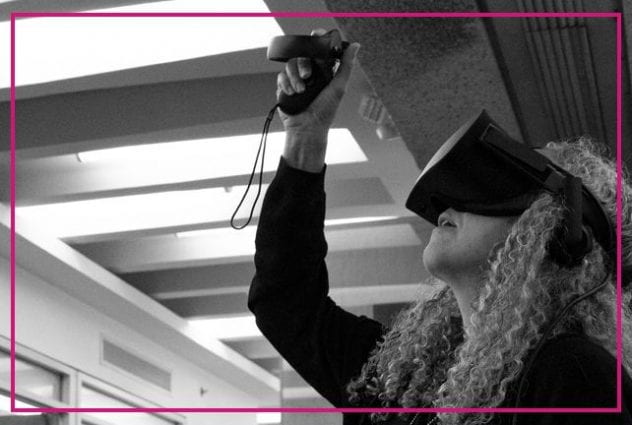This year, Price Lab’s week-long digital humanities training institute Dream Lab was canceled due to safety concerns around COVID-19. We created this series of podcasts not as a replacement, but rather to introduce you to some of the people who make Dream Lab such a great experience!
While we have been exposed to depictions of Augmented Reality (AR) through literature, TV and movies for many years, the pervasiveness of mobile platforms and devices have made many of these heretofore futuristic ideas part of our everyday lives. Historically, the future has been presented as an overwhelmingly white, male, place in which difference is minimized and heteronormativity is all but compulsory. Fortunately, this is changing. As we explore the ways that digital and physical realities intersect, it’s important to consider the narratives that are created, replicated, and reframed in augmented digital spaces—particularly when applying AR to our creative, research, and teaching efforts. Afrofuturism can help us do this work. Afrofuturism provides us with a language to describe and represent the history and future of Black cultural production; it offers a vision of fantastic and real-world space through multimodal narratives about difference, belonging, and technologically mediated identity formation; it’s a “way of seeing” that challenges historical depictions of homogenous, whitewashed, tomorrows; it also offers a way to consider inclusive design practices when imagining and developing AR objects and spaces. We’ll ask a host of questions in this workshop, but one of the most important will be: as we expand our understanding of “mixed” realities, what is the contribution of the humanist? Another will be: how might afrofuturism help us imagine a more inclusive augmented reality?
Workshop Goals:
This workshop will include discussions, demonstrations, and hands-on activities. Individuals in this workshop will: Participate in a theoretical and practical introduction to AR and afrofuturism, including hands-on tutorials for at least two AR platforms. Grapple with various methods for using location-based and image-based AR in creative, research, and classroom projects.
Engage with and share afrofuturist approaches to digital narrative-building, digital space creation, and digital embodiment.Work on a small AR project of their choosing, either individually or in small groups.
Pre-Workshop Assignments:
Workshop Readings and assignments will be available in a shared Google folder before, during, and after the workshop. Technical skills and requirements: Although basic HTML and CSS skills are helpful for the creation of more customized projects, they are not prerequisites for the workshop; no programming skills will be required. Participants will want to bring a mobile device (e.g., iPhone or Android-based smartphone) for the purposes of viewing and testing their project as well as a laptop computer for working in online AR studio applications.
Instructors:
Dr. Michael Sterling Burns is an Associate Professor of English at West Chester University. His teaching and scholarship evidence a continued interest in the connections between language practices and issues of social justice, especially in relation to African heritage people in the Americas. In addition to his work in First-Year Writing and the Academic Development Program (WCUs “Bridge” Program), Michael teaches courses in African American Rhetorics and Literatures, including the Afro-speculative course “Race and Space: Representations of Blackness on (and beyond) Terra Firma.”
Dr. Clayton Colmon is the Associate Director of Instructional Design for Penn Arts & Sciences Online Learning. His work lives at the intersection of critical race, gender, queer and utopian studies, as he examines the impact technology has on marginalized bodies and community-building efforts in digital spaces. He has presented and published scholarship on the significance of afrofuturism in literature, music, and critical pedagogy. Clay has also taught face-to-face and hybrid courses on digital rhetoric, American literature and science fiction.
Dr. Robert Fletcher teaches literary studies, writing, and digital humanities at West Chester University. He has published in the fields of Victorian studies, science fiction, and electronic literature and computer games, as well as on the medium of augmented reality. He has taught three seminars at WCU on augmented reality as a writing platform and has published his own augmented-reality app, Sight and Song, for Android smartphones on Google Play. You can read more about this project, Sight and Song Augmented, at the app’s companion website. In 2017, he published an essay on the developing aesthetics and rhetoric of AR in the Electronic Book Review.

